NBC's Brian Williams Headlines Commencement 2012
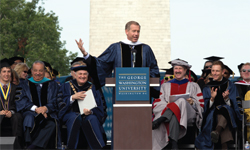
Speaker Brian Williams brought an edge of self-deprecating humor to his Commencement speech on innovation and courage.
William Atkins
May 20 was a beautiful day on the National Mall, the site of GW's Commencement ceremony, but a few clouds crept in overhead as speaker Brian Williams began his address.
"It's gotten dark because I'm about to talk about my academic career," said the renowned newsman, glancing up to laughter from the crowd of about 25,000 graduates, family members, and friends.
The anchor and managing editor of NBC Nightly News and host of Rock Center with Brian Williams delivered an address that veered from the personal—his own brief time at GW and his career journey from young fireman to White House correspondent—to the global, as he exhorted graduates to "keep us moving, push us, lift us up, make us better."
Mr. Williams told graduates that a last-minute weekend spent near Catholic University with a friend opened his eyes to Washington, D.C., where he studied briefly at Catholic University and GW while interning at the White House.
"I think they call it Potomac Fever," he joked.
Mr. Williams, who never graduated from college, received an honorary degree from GW for his exemplary work in the field of television journalism.
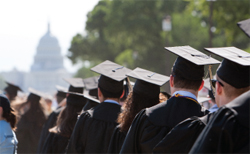
James A. Calder
"I like to say to people that I was in a big hurry, and I needed to go make a living, and I never looked back," he said. "But the truth is—as the last college I attended, I can tell you—I look back every day. I look in the mirror, and it's one of my great regrets. Don't forget that by being here today you have now achieved something I was not able to achieve."
Noting the ceremony's location near the Smithsonian National Air and Space Museum, Mr. Williams recalled some of the United States' space missions, saying that with each one, safety and success were uncertain, but it was important to press on for the future of the nation—and that GW graduates should do the same.
"You don't actually have to build a rocket or go into space, but please take us somewhere," he told the class.
The graduating seniors earned an exceptional sendoff in another way: a record-breaking 50 percent donated to the 2012 senior class gift, raising $42,613. As a result, GW Board of Trustees Vice Chair Nelson Carbonell, BS '85, and his wife, Michele, honored their "50 for 50 Challenge" from January and donated $50,000 to George Washington's Power & Promise Fund, which supports student financial aid.
For videos, photos, and more from GW's 2012 Commencement, visit go.gwu.edu/grad2012.
—Ruth Steinhardt
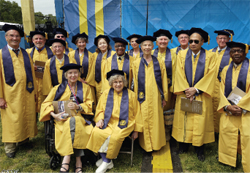 Sixteen members of the GW Alumni Emeriti Society—undergraduate alumni who graduated more than 50 years ago and alumni who are at least 72 years old—joined the academic procession on the National Mall during Commencement. Sixteen members of the GW Alumni Emeriti Society—undergraduate alumni who graduated more than 50 years ago and alumni who are at least 72 years old—joined the academic procession on the National Mall during Commencement.
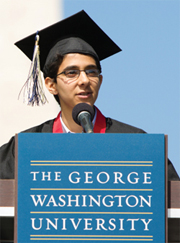
Graduating senior Noreen Kassam, BA '12, was selected as the student speaker for the ceremony and addressed the opportunities GW's location affords its students and the university's strong culture of service.
Jessica McConnell Burt
|
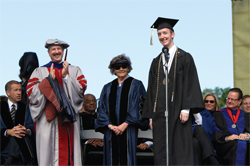 Artist and alumna Clarice Smith, BA '76, MFA '79 (above center), and international business leader and humanitarian Carlos Slim (below) both received honorary degrees and addressed the graduating class. Artist and alumna Clarice Smith, BA '76, MFA '79 (above center), and international business leader and humanitarian Carlos Slim (below) both received honorary degrees and addressed the graduating class.
Jessica McConnell Burt
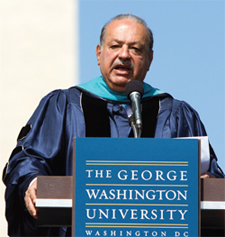
Jessica McConnell Burt
|
Women in the Workplace
12th Annual Women's Leadership Conference tackles employment issues.
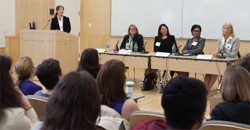
A panel of alumni, staff members, and local professionals discusses increasing the number of women in leadership positions at the Women's Leadership Conference on the Mount Vernon Campus.
Jessica McConnell Burt
In 2010, there were more women in the workplace than men, said former White House adviser Betsy Myers at the 12th annual Women's Leadership Conference, held in March at the Mount Vernon Campus. But despite their strength in numbers, she said, women still lag far behind their male counterparts when it comes to landing top leadership positions.
This year's conference, "You Are Not Supposed to Be Here," brought together more than 100 professional women—including many GW staff members, alumnae, and students—for a day of lively discussion.
In her keynote speech, Ms. Myers, the author of Take The Lead: Motivate, Inspire, and Bring out the Best in Yourself
and Everyone Around You and founding director of the Center for Women & Business at Bentley University, said that "[a] new era of leadership is necessary for a changing workplace."
"What worked in the past no longer works," she said, adding that in 2008, 70 percent of new entrants to the workplace were women and members of minority groups.
Her discussion touched upon her work for two U.S. presidents. She was President Bill Clinton's senior adviser on women's issues and the first director of the White House Office for Women's Initiatives and Outreach, and served as chief operating officer of Barack Obama's presidential campaign and chair of Women for Obama.
The conference also included an address by Donna J. Gambrell, director of the U.S. Department of the Treasury's Community Development Financial Institutions Fund, which provides resources to underserved populations and communities throughout the country.
The concluding panel, "Leadership: You Should Be There!" was moderated by Laura Taddeucci Downs, BA '92, MA '95,
former president of the GW Alumni Association. The discussion featured panelists Anne Saunders Fabry, BA '88, a director in Brown Rudnick's government, law, and strategies practice; Mary Davis Holt, a partner at Flynn Heath Hold Leadership; Terri Harris Reed, GW's vice provost for diversity and inclusion; and Mary Jo Warner, GW's senior associate director of athletics.
—Jamie L. Freedman
GW Joins Top 100 Research Schools
GW is now one of the nation's top 100 colleges and universities for funding spent on research and development projects, according to new data from the National Science Foundation.
The university's research and development expenditures from all funding sources—which include grants and contracts from federal, state, and local governments, industry, nonprofits, and GW's internal resources—increased by 97 percent in the 2010 fiscal year, to $196,917,000 over the previous year. The boost elevated GW to No. 99, up from No. 133 on a list numbering more than 600 institutions.
Expenditures, which represent actual money spent from grants and other resources, are a key measurement of an institution's research activity. GW Vice President for Research Leo Chalupa said the jump in the NSF ranking offered "another clear indication that GW is well on its way to realizing President Knapp's plan of becoming one of the nation's top research universities."
The Buzz Around Town

Jessica McConnell Burt
Hartmut Doebel, assistant professor of biological sciences, marked this bee and others with small dots so that they can be tracked as they fly around the city. For the second year, GW is partnering with Founding Farmers, an alumni-owned restaurant near campus, to host eight honeybee hives on the Lisner Hall rooftop.
To mark the bees, Dr. Doebel trapped them with a marking tube and applied a tiny dot on the thorax with a non-toxic marker. Dr. Doebel and his students hope members of the public will report sightings of the marked bees so that they can determine the foraging ranges for bees in a city environment.
Deepening Ties with China
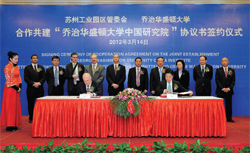
GW School of Business Dean Doug Guthrie (fourth from left), Provost Steven Lerman (fifth from left), President Steven Knapp (sitting, left), Suzhou Industrial Park Administrative Committee Chairman Barry Yang Zhi Ping (sitting, right), and Chinese officials take part in a ceremonial signing in Suzhou.
GW School of Business
When the School of Business launched its new joint master's degree in finance with a university in China, it marked a first for the school. It also signaled the beginning of a deeper push by the George Washington University to establish a multilayered connection with one of the world's most powerful economies.
"I believe that our identity as a school and a university, as well as the type of students that we attract, will be built around deep relationships such as the one we are developing with China," says School of Business Dean Doug Guthrie, a noted China scholar who is spearheading the GW effort.
This fall, 22 Chinese students enrolled in the new Master of Science in Finance program will arrive in the D.C. area to begin their second year of study. Their first year of coursework unfolded in Suzhou, China, in an academic partnership with Renmin University of China International College (RUC-IC).
"Finance is one of the greatest areas of need in China today, and we are bringing the excellence of GW's finance program,"
Dr. Guthrie says.
Students who complete the program receive an MSF from GW's School of Business and a certificate in financial training from Renmin.
In addition, the School of Business has announced the launch of an International Master of Accountancy, a two-year program also offered jointly with RUC-IC. During the first semester of that program, students take classes—taught by faculty members from RUC-IC and GW—in China. The remainder of the program consists of classes at GW. Students who complete the program receive a master's degree in accountancy from GW and an accountancy certificate in financial training from RUC-IC.
As further evidence of the growing ties between China and GW, President Steven Knapp traveled to China in March along with Dean Guthrie and Provost Steven Lerman to sign a memorandum of understanding to create the GW-China Research Institute in conjunction with the Suzhou Industrial Park. The center will function as a partnership and research incubator with Chinese institutions located in the industrial park, which has a residential population of 700,000.
The GW-China Research Institute takes advantage of the rich opportunities offered through the industrial park's Dushu Lake Science Education and Innovation District. It also builds on GW's multiple China connections.
"Our university is very fortunate to have many ties to China," President Knapp says. "We have nearly 800 students from China who are currently studying here. Our Elliott School has the distinguished Sigur Center for Asian Studies that includes many leading experts on China."
Dean Guthrie, who is fluent in Mandarin, completed his PhD research in China. His 1999 book, Dragon in a Three Piece Suit, examined the social and cultural influences shaping China's economic transition. His 2009 book, China and Globalization, looks at China's new role in the world.
GW's broadened presence in China is creating not just an academic platform but also a business bridge for the District of Columbia. D.C. Deputy Mayor Victor Hoskins was part of the group that traveled to China with President Knapp and Dean Guthrie. And the District's Department of Small and Local Business Development is looking into opportunities in China for local companies, particularly in the area of exports. District Mayor Vincent Gray has said D.C.'s economy must innovate in order to thrive.
"China proves every day that the impossible is possible," Mayor Gray says. "Technology is the future of [D.C.], and we look forward to expanding our relationships internationally to be able to explore it."
In January the District launched ExportDC, offering overseas marketing assistance and grants to help qualified D.C. businesses offset the cost of trade missions, international trade shows, export training, and translation services.
"I think that having deep knowledge and deep ties to a specific place in the world is a critical part of successfully doing business in the global economy," Dean Guthrie says. "It's wonderful that we have a large and robust international business department in this school, but to me we need to take it a step further.
"It's not just about creating opportunities for students and for faculty to do research abroad, but we need to think about how we actually change as an institution by having deep in-country relationships. China is the first step in our larger global initiative," Dean Guthrie adds.
—Mary A. Dempsey
George Welcomes…
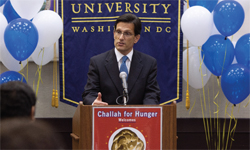 "We're a country whose power is derived from the people. It's not a dictatorship. It doesn't come from on high. It comes from situations like this where good ideas grow. I encourage you, take advantage." "We're a country whose power is derived from the people. It's not a dictatorship. It doesn't come from on high. It comes from situations like this where good ideas grow. I encourage you, take advantage."
—�House Majority Leader Eric Cantor (R-Va.), BA '85 (above), at GW Hillel at an event organized by GW Challah for Hunger.
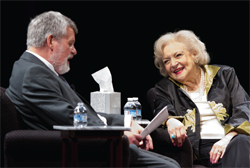 "I know they're not really the most glamorous. But they live up in the high country, on the edge of these mountain lakes. It's up in the lonely country where there aren't a lot of people." "I know they're not really the most glamorous. But they live up in the high country, on the edge of these mountain lakes. It's up in the lonely country where there aren't a lot of people."
—�Betty White, actress, comedian, and animal-rights activist, on why, if she could be any animal, she would be a moose. She spoke at Lisner Auditorium in May at a Smithsonian Associates Program event.
William Atkins
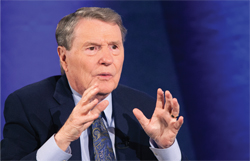
"The lesson that everybody in journalism needs to know, one way or another…is just how fragile everything is. Everything is subject to change just like that [snaps fingers]. And you have to be prepared for that."
—�Award-winning broadcaster Jim Lehrer was on the scene as a reporter in Dallas when President John F. Kennedy was assassinated and spoke about it at this season's last Kalb Report at the National Press Club.
Jessica McConnell Burt
|
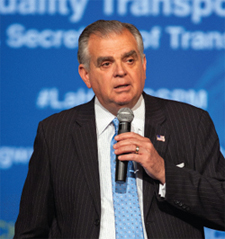 "Distracted driving is an epidemic because we all own [cell phones], and we all use them wherever we go. Some people are using them right now…it's OK, I'm not insulted. What I do get mad about is when we use them while we're driving." "Distracted driving is an epidemic because we all own [cell phones], and we all use them wherever we go. Some people are using them right now…it's OK, I'm not insulted. What I do get mad about is when we use them while we're driving."
—�Secretary of Transportation Ray La Hood (below) at GW's Jack Morton Auditorium in April. The discussion touched on bipartisanship in the federal government, Americans' interest in light rail, and his campaign to stop distracted driving.
William Atkins
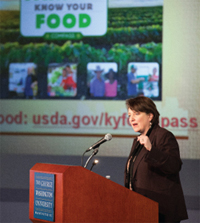
"We need to have young people decide to farm and ranch. But if you don't have access to health care, a main street with shops, and a good school to send your kids to, you're not going to want to stay on the farm."
—�Kathleen Merrigan, U.S. Department of Agriculture deputy secretary, on the rural "outmigration" in farming areas. She participated in a Trachtenberg School of Public Policy and Public Administration forum on the farm bill, which funds nutrition assistance and conservation programs, and provides farmers with subsidies.
William Atkins
For more information on these and other events hosted at GW, go to gwtoday.gwu.edu.
|
School of Nursing Advances Rural RNs
New partnership will give nurses living in the Shenandoah Valley the opportunity to earn advanced degrees from GW.
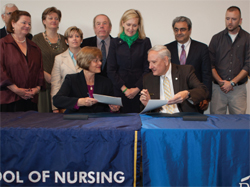
Jean Johnson, School of Nursing dean, and Richard Teaff, president of Dabney S. Lancaster Community College, signed a memorandum of understanding to expand advanced nursing education in rural Virginia through GW's new associate's degree to bachelor's/master's degree program.
William Atkins
In rural and isolated areas of the Shenandoah Valley, quality health care is not always convenient—or even available. In some places, women have to drive almost an hour on mountain roads to receive obstetric care or deliver in the local emergency room. Educating just four new nurses a year would create approximately 20,000 new primary care visits annually—and GW's School of Nursing has partnered with an area community college in hopes of achieving some of that improvement. The partnership will increase the number of nurses and nurse-midwives available, using a combination of in-person and distance learning that can serve as a national model.
In April, Jean Johnson, dean of the School of Nursing, signed a memorandum of understanding with President Richard Teaff of Dabney S. Lancaster Community College (DSLCC) in Clifton Forge, Va., that will allow students to earn a bachelor's and master's degree from GW while still serving the communities they live in. The program is open not only to DSLCC students and alumni but also to any registered nurse with an associate's degree. The two available concentrations will prepare students to be either a family nurse practitioner or nurse-midwife. The area currently has no practicing obstetricians, so the program will provide it with much-needed care. The nurse-midwifery concentration is offered through a partnership with Shenandoah University.
Students will complete coursework online, with preceptorships in clinical practice sites as near to their home communities as possible. GW faculty members will conduct site visits.
The program is tailored to give enrollees many options: They may even exit the program midway with a Bachelor of Science in Nursing (BSN) degree. This provides students with an academic credential option in the event that their plans or availability should change, while still helping hospitals meet their requirements for BSN-educated nurses.
"This innovative public-private partnership directly addresses Governor Bob McDonnell's call for more Virginians earning degrees, particularly in high demand fields like health care," said Virginia Secretary of Education Laura Fornash. "Ensuring underserved communities receive the medical care they need is important to the health of our communities as well as the commonwealth of Virginia….We hope [the program] will serve as a model for the rest of the state and the country."
Three Revamped Buildings Get Green
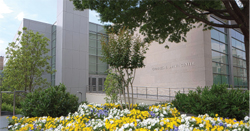
The newly renovated Charles E. Smith Center is one of the university's three most recent LEED Gold-certified buildings.
William Atkins
GW's athletics complex, the Charles E. Smith Center, residence building Lafayette Hall on the Foggy Bottom Campus, and Ames Hall on the Mount Vernon Campus all received Leadership in Energy and Environmental Design (LEED) Gold certification this spring, bringing the total number of LEED Gold-certified buildings on campus to five.
Upgrades to the Charles E. Smith Center, which were completed in 2011, include a refurbished arena and locker rooms, a new box office and refreshment areas, as well as a renovated Colonials Club. To keep the building ecologically sound, sustainable features like energy-efficient windows and insulation, a low-flow plumbing system, and an environmentally friendly construction process were used.
Lafayette Hall's green features include an energy-efficient roof, thermal controls for all occupants, and green house-keeping practices.
The expanded Ames Hall is the academic centerpiece of Mount Vernon, featuring five stories of state-of-the-art classrooms, faculty offices, student lounges, and study rooms. The revamped Ames houses a number of prominent academic departments, including the University Writing Program and the University Honors Program.
The university has committed to targeting a minimum of LEED Silver for all new buildings.
New Members Join Board of Trustees
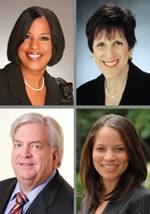
(Clockwise from top left) Roslyn Brock, Madeleine Jacobs, Titilola "Titi" Williams-Davies, and A. Michael Hoffman are the newest members of the GW Board of Trustees.
In May, GW's Board of Trustees elected four new members, approved the university's fiscal 2013 operating and capital budgets, and announced significant gifts to support scholarships and academic programs.
Roslyn Brock, A. Michael Hoffman, Madeleine Jacobs, and Titilola "Titi" Williams-Davies are the newest trustees. Roslyn Brock, MHSA '89, is vice president of advocacy and government relations for Bon Secours Health System Inc., in Marriottsville, Md. She is chairman of the National Board of Directors for the NAACP and also serves on GW's School of Public Health and Health Services Dean's Council.
A. Michael Hoffman, co-founder and chairman of Palamon Capital Partners, was also founding director of the Shakespeare Globe Theatre and served on its board for 10 years.
Madeleine Jacobs, BS '68, is executive director and CEO of the American Chemical Society, the world's largest scientific society. In 2003, Ms. Jacobs received an honorary Doctor of Science degree from GW.
Recent alumni trustee Titi Williams-Davies, BBA '07, MBA '09, is a management consultant with UPD Consulting, a public-sector management consulting firm, where she works as a business analyst in the Office of Special Education in D.C.'s public schools system. Ms. Williams-Davies also served as a Presidential Administrative Fellow at GW.
National Science Foundation Honors Four
CAREER grants will advance faculty research and teaching.
Four GW faculty members received National Science Foundation Faculty Early Career Development (CAREER) awards, each worth approximately $400,000 over five years. They are the foundation's most prestigious award for junior faculty and are awarded to faculty members who excel at both research and teaching.
Three of the four grantees are School of Engineering and Applied Science faculty members.
"This is a first for SEAS, and big news," says David Dolling, dean of the School of Engineering and Applied Science. "It's the sort of accomplishment that any engineering school—including the top schools in the country—aims for….Competition for the NSF CAREER awards is very stiff, and this is a nice validation of the successful hiring we have undertaken at SEAS over the past three years."
 The winners are Yongsheng Leng, assistant professor of mechanical and aerospace engineering; Gabriel Parmer, assistant professor of computer science; Guru Prasadh Venkataramani, assistant professor of electrical and computer engineering; and Svetlana Roudenko, assistant professor in the department of mathematics in the Columbian College of Arts and Sciences.
The winners are Yongsheng Leng, assistant professor of mechanical and aerospace engineering; Gabriel Parmer, assistant professor of computer science; Guru Prasadh Venkataramani, assistant professor of electrical and computer engineering; and Svetlana Roudenko, assistant professor in the department of mathematics in the Columbian College of Arts and Sciences.
Each award winner submitted a proposal describing a research problem, as well as education and outreach components.
Dr. Leng's research involves developing a computational framework to investigate structural properties in liquid films, a type of material that is typically only a few nanometers thick. This research can be applied to the lubrication in car engines to increase engine efficiency. Dr. Leng's proposal also includes education and outreach components that involve local high school students at Washington, D.C.'s School Without Walls, as well as undergraduate and graduate students at GW.
Dr. Parmer's research investigates methods to make computer systems essentially self-repairing—able to recover from faults and to resume predictable operation. His proposal is to develop a new operating system structure for real-time systems—the systems that control our physical world, such as the millions of lines of computer code running a Boeing aircraft's flight systems. Dr. Parmer has already been lecturing about computer programming to high school students at Edison Academy in Alexandria, Va., and under the CAREER grant, he plans to expand his involvement with students there who are interested in advanced computing.
Better computing is also the focus of Dr. Venkataramani's research. He is interested in improving efficiency in multicore processors, which power many types of common devices, including smartphones and tablet computers.
Dr. Roudenko's research on a specific type of equation may help researchers learn to predict the formation of ocean "super waves" that can damage ships, how to focus a laser beam through different media so that it can reliably burn—or not burn—a specific point, and how airline pilots can differentiate minor turbulence from the dangerous kind. Her work will focus on a theory to better explain how nonlinear evolution equations function, and it will also focus on teaching students at many levels—from ninth graders up through graduate school—how to explore and enjoy mathematics. For the outreach and teaching portions of the grant, Dr. Roudenko will work to create vertical integration of math education, starting with young students.
A Plan for the Future
Strategic planning committee sets goals for GW's bicentennial.
The steering committee to develop George Washington University's next strategic plan has identified four major themes to help guide the planning process: globalization, governance and policy, innovation through interdisciplinary collaboration, and citizenship and leadership.
These themes were chosen after an inventory both of the university's major strengths and of the societal trends that will affect higher education—and GW in particular—in the decade to come. Each has been addressed by a working group, consisting of faculty members, staff members, administrators, and students from multiple disciplines across the university, who identified specific actions to help position GW for excellence in a changing world.
The goal of the process is a strategic plan that will create a strong signature identity for GW. The plan aims to help the university equip students to be national and world leaders and advance knowledge in ways that have significant positive effects on the human condition.
A Banner Season for GW Athletes
Athletics and Recreation celebrated one of its most successful seasons of all time in 2011–12, with five varsity teams winning championships: golf (Atlantic 10 champions), men's tennis (A-10 champions), men's soccer (regular season A-10 co-champions), men's squash (Summers Cup champions), and women's squash (Summers Cup champions).
The golf team, coached by Atlantic 10 Coach of the Year Terry Shaffer, brought home its first-ever A-10 conference championship, while the men's tennis team, under head coach Greg Munoz, defended its 2010–11 championship win, earning back-to-back A-10 titles. The tennis team also swept the conference year-end awards, as freshman Francisco Dias was named both Most Outstanding Performer and Most Outstanding Rookie Performer—the league's first-ever men's tennis student-athlete to earn both honors—and MVP Ugur Atalay was named the recipient of the Atlantic 10 Sportsmanship Award for the 2011–12 academic year.
The men's and women's squash programs are champions of their respective Summers Cups. This is the second national championship in three seasons for the women's team, and the first ever for the men's.
Recently retired GW men's soccer coach George Lidster received a great send-off in his 24th and final season coaching for GW, with the team finishing as regular season A-10 co-champions.
The Colonials saw three more programs—men's soccer, women's rowing, and softball—claim runner-up status at the A-10 championships. The A-10 also honored women's rowing head coach Eric Carcich, who was voted Coach of the Year by his peers after coaching his team to a four-spot improvement over last season. Men's and women's basketball, lacrosse, and volleyball were also among the postseason qualifiers.
2011–12 GW Athletics by the Numbers
5 Championships
35 All-conference performers
25 Academic all-conference honorees
4 Atlantic 10 Coaches of the Year
84 Student-athletes on the A-10 Commissioner's Honor Roll
232 Student-athletes on the fall Athletic Academic Dean's List
256 Student-athletes on the spring Athletic Academic Dean's List
35 Community service initiatives
8 New GW Athletics Hall of Famers
73 Graduates
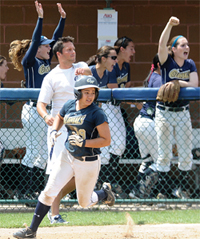
Rising sophomore Tori Valos rounds first base after hitting a home run against eventual champ University of Massachusetts on the second day of the A-10 Championship Tournament in St. Louis. GW broke the program record for wins in a season this year, and reached the A-10 finals for the first time in program history.
GW Athletics Communications
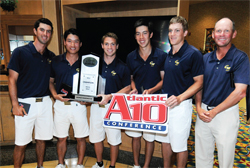
The golf team brought home its first-ever A-10 conference championship, unseating six-time defending champion and second-place finisher Charlotte by two strokes and setting a new program record.
GW Athletics Communications
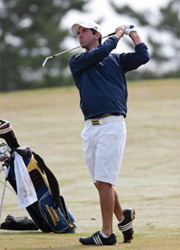
Golf team MVP Andres Pumariega, who competed in the sectional qualifier of the U.S. Open in June, takes a swing at the 14th annual George Washington Intercollegiate Invitational at the Bear Trap Dunes Golf Club in Bethany Beach, Del.
Judy Rolfe
|
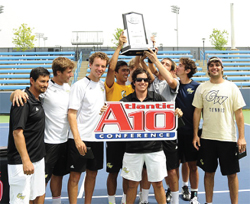
The men's tennis team celebrates its second A-10 championship title in a row.
GW Athletics Communications
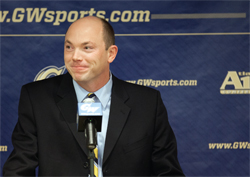
Jonathan Tsipis, a former associate head coach at Notre Dame, has been named GW's new head women's basketball coach. In 2011 and 2012, he helped lead his team to back-to-back NCAA National Championship game appearances—and now hopes to do the same for GW.
William Atkins
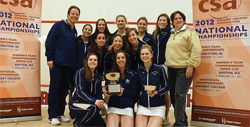
(Above and below) The men's and women's squash programs, champions of their respective Summers Cups, will welcome what coach Wendy Lawrence has called their "best-ever" recruiting classes, featuring two top-30 junior men's players and, on the women's team, the single highest-rated recruit in GW Squash history.
GW Athletics Communications
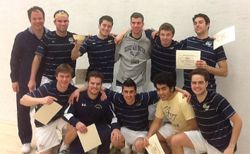
GW Athletics Communications
|
Hoop Dreams
GW's men's basketball team is poised for greatness in the upcoming season. Regional television partnerships were reached with both MASN and Comcast SportsNet Mid-Atlantic—nearly doubling the number of televised basketball games from 2010–11 to 2011–12. And increasing recruitment efforts have yielded an impressive incoming recruiting class featuring two All-Met performers from local high schools and three international signees. Season tickets go on sale in July; to purchase, visit GWSports.com.
At a Glance
Sustainability Minor
In response to high demand, GW will begin offering an interdisciplinary minor in sustainability this fall. The 18-credit minor will not be housed in one particular school. Rather, it will be overseen by the Office of the Provost and provide a broad-spectrum education with courses in all of the university's schools and colleges. All GW undergraduate students will be eligible for the minor, regardless of the school they're in or their major.
The minor will require students to take a newly created introduction to sustainability course, team-taught by faculty members representing different schools. They will then choose one of three tracks to pursue: environmental and earth systems, society and sustainability, or policy organization and leadership. Students also will be required to complete a culminating experience, which could include community service, an internship, or a research project.
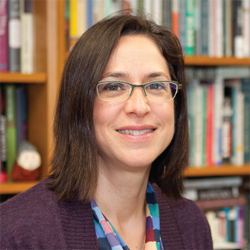
William Atkins
Guggeinheim Fellow
Gayle Wald, professor and chair of the English department, has won a Guggenheim Fellowship. Her fellowship will begin this summer, when she will be working on a book titled "It's Been Beautiful": Soul! and Black Power Television under contract with Duke University Press. The book will focus on the PBS show Soul! and its impact as a showcase of black performing arts. Dr. Wald teaches courses on African-American literature, popular music, and U.S. culture.
A Home for Public Health
A symbolic sledgehammer swing against a wall inside the Warwick Memorial Building on 2300 K Street marked the first step in the demolition of the building, which will make way for the new School of Public Health and Health Services building.

President Steven Knapp (left) and SPHHS Dean Lynn Goldman (second from right) participate in a ceremony for the new SPHHS building.
Jessica McConnell Burt
The ceremony brought together students, faculty, staff, school administrators, the SPHHS Dean's Council, alumni, and others. The new SPHHS building is slated to open in time for spring 2014 classes. The building will house about 115,000 square feet of academic, administrative, and meeting space, and will allow the more than 200 full- and part-time faculty members, 1,200 graduate and undergraduate students, and staff members—currently spread across eight locations—to convene under one roof.
Vets Writing Course
A veterans' writing workshop that retired Lt. Col. Ron Capps has been leading with the University Writing Program since last fall is set to become a regular credit-bearing course. A gift from Joanne Holbrook Patton, MVS '48—widow of Maj. Gen. George S. Patton Jr., son of World War II Gen. George Patton—is helping fund the course. A member of the U.S. Army and Army Reserve, Lt. Col. Capps went to five wars in a 10-year span and created the Veterans Writing Project as a free program to help veterans and their family members write about their experiences. Since last fall, Lt. Col. Capps also has been teaching student-veterans at GW in a series of workshops funded by the University Writing Program.
Education Institute
The Center for Education Policy, an internationally renowned source of data and analyses pertinent to decision-making at all levels of education, is now housed at GW's Graduate School of Education and Human Development. Founded in 1995, the center produces publications, convenes meetings, gives presentations, and provides expert advice—and will be a crucial part of GSEHD's continuing commitment to linking research and teaching to educational policy and practice. Maria Voles Ferguson, formerly of the nonprofit Alliance for Excellent Education, became the center's executive director in June.
Mallon Elected to AAAS
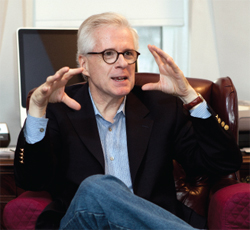
Director of Creative Writing Thomas Mallon
Jessica McConnell Burt
Thomas Mallon, acclaimed author and GW's director of creative writing, was elected to the American Academy of Arts & Sciences and is now part of an elite class of 220 that includes winners of the Pulitzer Prize, MacArthur and Guggenheim fellowships, Kennedy Center Honors, and Grammy, Emmy, Academy, and Tony awards.
Dr. Mallon is the author of eight books of fiction, including Henry and Clara, Bandbox, Fellow Travelers, and the recently published Watergate: A Novel (see Faculty for Writing).
Dr. Mallon earned a PhD in English and American literature from Harvard University in 1978. He has received the Guggenheim and Rockefeller fellowships, a National Book Critics Circle award, and the Harold D. Vursell Memorial Award from the American Academy of Arts and Letters for distinguished prose style. A former literary editor of GQ magazine and deputy chairman of the National Endowment for the Humanities, Dr. Mallon has been director of creative writing at GW since 2010.
This is the second year in a row members of the GW community have been selected to join AAAS. Last year's inductees included President Steven Knapp and University Professor Martha Finnemore.



 Sixteen members of the GW Alumni Emeriti Society—undergraduate alumni who graduated more than 50 years ago and alumni who are at least 72 years old—joined the academic procession on the National Mall during Commencement.
Sixteen members of the GW Alumni Emeriti Society—undergraduate alumni who graduated more than 50 years ago and alumni who are at least 72 years old—joined the academic procession on the National Mall during Commencement. 
 Artist and alumna Clarice Smith, BA '76, MFA '79 (above center), and international business leader and humanitarian Carlos Slim (below) both received honorary degrees and addressed the graduating class.
Artist and alumna Clarice Smith, BA '76, MFA '79 (above center), and international business leader and humanitarian Carlos Slim (below) both received honorary degrees and addressed the graduating class. 



 "We're a country whose power is derived from the people. It's not a dictatorship. It doesn't come from on high. It comes from situations like this where good ideas grow. I encourage you, take advantage."
"We're a country whose power is derived from the people. It's not a dictatorship. It doesn't come from on high. It comes from situations like this where good ideas grow. I encourage you, take advantage."  "I know they're not really the most glamorous. But they live up in the high country, on the edge of these mountain lakes. It's up in the lonely country where there aren't a lot of people."
"I know they're not really the most glamorous. But they live up in the high country, on the edge of these mountain lakes. It's up in the lonely country where there aren't a lot of people." 
 "Distracted driving is an epidemic because we all own [cell phones], and we all use them wherever we go. Some people are using them right now…it's OK, I'm not insulted. What I do get mad about is when we use them while we're driving."
"Distracted driving is an epidemic because we all own [cell phones], and we all use them wherever we go. Some people are using them right now…it's OK, I'm not insulted. What I do get mad about is when we use them while we're driving."



 The winners are Yongsheng Leng, assistant professor of mechanical and aerospace engineering; Gabriel Parmer, assistant professor of computer science; Guru Prasadh Venkataramani, assistant professor of electrical and computer engineering; and Svetlana Roudenko, assistant professor in the department of mathematics in the Columbian College of Arts and Sciences.
The winners are Yongsheng Leng, assistant professor of mechanical and aerospace engineering; Gabriel Parmer, assistant professor of computer science; Guru Prasadh Venkataramani, assistant professor of electrical and computer engineering; and Svetlana Roudenko, assistant professor in the department of mathematics in the Columbian College of Arts and Sciences.








